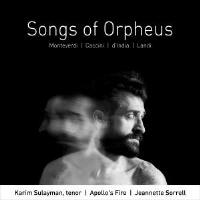Texte paru dans: / Appeared in: |
|
|
Outil de traduction (Très approximatif) |
|
|
Reviewer:
Alexandra Coghlan To build a programme of 17th-century music for tenor and ensemble around the myth of Orpheus and not include ‘Possente spirto’ – the hero’s extraordinary Act 3 aria from Monteverdi’s Orfeo – seems at best cheap (would some additional players for one session really have broken the budget?) and at worst wilful. It’s a hole through the musical heart of this otherwise interesting programme from the Lebanese-American tenor Karim Sulayman and Apollo’s Fire. But you can always rely on Apollo’s Fire (otherwise known as the Cleveland Baroque Orchestra) and their artistic director Jeannette Sorrell to do things a little differently, and ‘Songs of Orpheus’ is no exception. Personality rather than authenticity is the group’s watchword, manifest here in textures gently thickened and adapted to accommodate the ensemble. The resulting lushness is pleasantly, indulgently transgressive but does tend to smooth the rougher edges of these emotionally charged episodes from Monteverdi, Caccini, d’India and Landi. The selection of arias and songs (broken up with some vivacious sonatas by Cima and Castello) is one that allows us to trace the legend from the stripped-back intensity of Caccini’s L’Euridice and Monteverdi’s assured, early handling through the next generation of composers, for whom grief is secondary to a good tune (a very good tune indeed, in the case of Merula’s ‘Folle e ben che si crede’). Sulayman makes a pleasant, personable hero, letting the text lead the way here, just as it should, and balancing a light, agile top to his voice with a baritonal warmth at the bottom. But compare this collection to similar concept-projects from Jaroussky and I Barocchisti (Erato, 4/17), Julian Prégardien and Teatro del Mondo (CPO) and, inevitably, L’Arpeggiata (Erato, 10/16), and both Sulayman and Apollo’s Fire fall a little short, lacking the ferocity, the conviction to force the emotional moment to its crisis. In their hands it’s Orpheus’s beautiful music, not his ugly emotion, that we remember – a trade-off that doesn’t feel entirely satisfying. |
|




